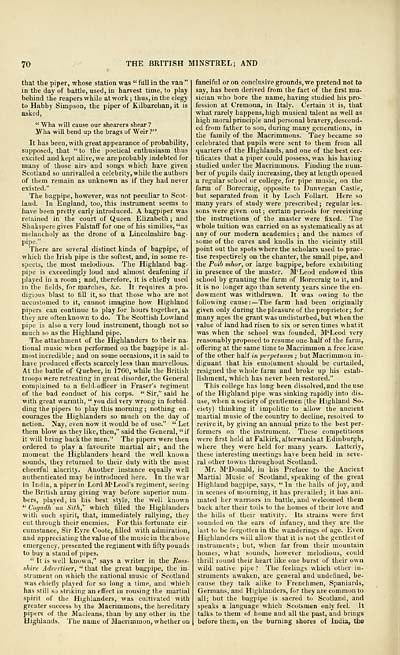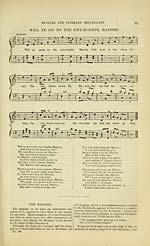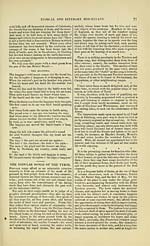Glen Collection of printed music > Printed music > British minstrel, and musical and literary miscellany
(408) Page 70
Download files
Complete book:
Individual page:
Thumbnail gallery: Grid view | List view

70
THE BRITISH MINSTREL; AND
that the piper, whose station was "full in the ran "
in the day of battle, used, in harvest time, to play
behind the reapers while at work ; thus, in the elegy
to Habby Simpson, the piper of Kilbarchan, it is
asked,
" Wha will cause our shearers shear ?
JVha will bend up the brags of Weir?"
It has been, with great appearance of probability,
supposed, that "to the poetical enthusiasm thus
excited and kept alive, we are probably indebted for
many of those airs and songs which have given
Scotland so unrivalled a celebrity, while the authors
of them remain as unknown as if they had never
existed."
The bagpipe, however, was not peculiar to Scot-
land. In England, too, this instrument seems to
have been pretty early introduced. A bagpiper was
retained in the court of Queen Elizabeth ; and
Shakspere gives Faistaff for one of his similies, "as
melancholy as the drone of a Lincolnshire bag-
pipe."
There are several distinct kinds of bagpipe, of
which the Irish pipe is the softest, and, in some re-
spects, the most melodious. The Highland hag-
pipe is exceedingly loud and almost deafening if
played in a room ; and, therefore, it is chiefly used
in the fields, for marches, Sec. It requires a pro-
digious blast to fill it, so that those who are not
accustomed to it, cannot imagine how Highland
pipers can continue to play for hours together, as
they are often known to do. The Scottish Lowland
pipe is also a very loud instrument, though not so
much so as the Highland pipe.
The attachment of the Highlanders to their na-
tional music when performed on the bagpipe is al-
most incredible; and on some occasions, it is said to
have produced efl'ects scarcely less than mai'vellous.
At the battle of Quebec, in 1760, while the British
troops were retreating in great disorder, the General
complained to a field-officer in Eraser's regiment
of the bad conduct of his corps. " Sir," said he
with great warmth, " you did very wrong in forbid-
ding the pipers to play this morning ; nothing en-
courages the Highlanders so much on the day of
action. Nay, even now it would be of use." " Let
them blow as they like, then," said the General, " if
it will bring back the men." The pipers were then
ordered to play a favourite martial air; and the
moment the Highlanders heard the well known
sounds, they returned to their duty with the most
cheerful alacrity. Another instance equally well
authenticated may be introduced here. In the war
in India, a piper in LordM'Leod's regiment, seeing
the British army giving way before superior num-
bers, played, in his best style, the well known
" Cogadh na Sith,'" which filled the Highlanders
witli such spirit, that, immediately rallying, they
cut through their enemies. For this fortunate cir-
cumstance. Sir Eyre Coote, filled with admiration,
and appreciating the value of the music in the above
emergency, presented the regiment with fifty pounds
to buy a stand of pipes.
" It is well known," says a writer in the Ross-
shire Advertiser, "that the great bagpipe, the in-
strument on which the national music of Scotland
was chiefly played for so long a time, and which
has still so striking an efl'ect in rousing the martial
spirit of the Highlanders, was cultivated with
greater success by the Macrimmons, the hereditary
pipers of the Macleans, than by any other in the
Highlands. The name of Macrimmon, whether on
fanciful or on conclusive grounds, we pretend not to
say, has been derived from the fact of the first mu-
sician who bore the name, having studied his pro-
fession at Cremona, in Italy. Certain it is, that
what rarely happens, high musical talent as well as
high moral principle and personal bravery, descend-
ed from father to son, during many generations, in
the family of the Macrimmons. Tney became so
celebrated that pupils were sent to them from all
quarters of the Highlands, and one of the best cer-
tificates that a piper could possess, was his having
studied under the Macrimmons. Finding the num-
ber of pupils daily increasing, they at length opened
a regular school or college, for pipe music, on the
farm of Borecraig, opposite to Dunvegan Castle,
but separated from it by Loch FoUart. Here so
many years of study were prescribed; regular les-
sons were given out ; certain periods for receiving
the instructions of the master were fixed. The
whole tuition was carried on as systematically as at
any of our modern academies ; and the names of
some of the caves and knolls in the vicinity still
point out the spots where the scholars used to prac-
tise respectively on the chanter, the small pipe, and
the Poib mhoT, or large bagpipe, before exhibiting
in presence of the master. M'Leod endowed this
school by granting the farm of Borecraig to it, and
it is no longer ago than seventy years since the en-
dowment was withdrawn. It was owing to the
following cause: — The farm had been originally
given only during the pleasure of the proprietor; for
many ages the grant was undisturbed, but when the
value of land had risen to six or seven times what it
was when the school was founded, M'Leod very
reasonably proposed to resume one-half of the farm,
oft'ering at the same time to Macrimmon a free lease
of the other half in perpetmvm ; but Macrimmon in-
dignant that his emolument should be curtailed,
resigned the whole farm and broke up his estab-
lishment, which has never been restored."
This college has long been dissolved, and the use
of the Highland pipe was sinking rapidly into dis-
use, when a society of gentlemen (the Highland So-
ciety) thinking it impolitic to allow the ancient
martial music of the country to decline, resolved to
revive it, by giving an annual prize to the best per-
formers on the instrument. These competitions
were first held at Falkirk, afterwards at Edinburgh,
where they were held for many years. Latterly,
these interesting meetings have been held in seve-
ral other towns throughout Scotland.
Mr. M'Donald, in his Preface to the Ancient
Martial Music of Scotland, speaking of the great
Highland bagpipe, says, " In the halls of joy, and
in scenes of mourning, it has prevailed ; it has ani-
mated her warriors in battle, and welcomed them
back alter their toils to the homes of their love and
the hills of their nativity. Its strains were first
sounded on the ears of infancy, and they are the
last to be forgotten in the wanderings of age. Even
Highlanders will allow that it is not the gentlest of
instruments; but, when far from their mountain
homes, what sounds, however melodious, could
thrill round their heart like one burst of their own
wild native pipe ? The feelings which other in-
struments awaken, are general and undefined, be-
cause they talk alike to Frenchmen, Spaniards,
Germans, and Highlanders, for they are common to
all; but the bagpipe is sacred to Scotland, and
speaks a language which Scotsmen only feel. It
talks to them of home and all the past, and brings
before them, on the burning shores of India, the
THE BRITISH MINSTREL; AND
that the piper, whose station was "full in the ran "
in the day of battle, used, in harvest time, to play
behind the reapers while at work ; thus, in the elegy
to Habby Simpson, the piper of Kilbarchan, it is
asked,
" Wha will cause our shearers shear ?
JVha will bend up the brags of Weir?"
It has been, with great appearance of probability,
supposed, that "to the poetical enthusiasm thus
excited and kept alive, we are probably indebted for
many of those airs and songs which have given
Scotland so unrivalled a celebrity, while the authors
of them remain as unknown as if they had never
existed."
The bagpipe, however, was not peculiar to Scot-
land. In England, too, this instrument seems to
have been pretty early introduced. A bagpiper was
retained in the court of Queen Elizabeth ; and
Shakspere gives Faistaff for one of his similies, "as
melancholy as the drone of a Lincolnshire bag-
pipe."
There are several distinct kinds of bagpipe, of
which the Irish pipe is the softest, and, in some re-
spects, the most melodious. The Highland hag-
pipe is exceedingly loud and almost deafening if
played in a room ; and, therefore, it is chiefly used
in the fields, for marches, Sec. It requires a pro-
digious blast to fill it, so that those who are not
accustomed to it, cannot imagine how Highland
pipers can continue to play for hours together, as
they are often known to do. The Scottish Lowland
pipe is also a very loud instrument, though not so
much so as the Highland pipe.
The attachment of the Highlanders to their na-
tional music when performed on the bagpipe is al-
most incredible; and on some occasions, it is said to
have produced efl'ects scarcely less than mai'vellous.
At the battle of Quebec, in 1760, while the British
troops were retreating in great disorder, the General
complained to a field-officer in Eraser's regiment
of the bad conduct of his corps. " Sir," said he
with great warmth, " you did very wrong in forbid-
ding the pipers to play this morning ; nothing en-
courages the Highlanders so much on the day of
action. Nay, even now it would be of use." " Let
them blow as they like, then," said the General, " if
it will bring back the men." The pipers were then
ordered to play a favourite martial air; and the
moment the Highlanders heard the well known
sounds, they returned to their duty with the most
cheerful alacrity. Another instance equally well
authenticated may be introduced here. In the war
in India, a piper in LordM'Leod's regiment, seeing
the British army giving way before superior num-
bers, played, in his best style, the well known
" Cogadh na Sith,'" which filled the Highlanders
witli such spirit, that, immediately rallying, they
cut through their enemies. For this fortunate cir-
cumstance. Sir Eyre Coote, filled with admiration,
and appreciating the value of the music in the above
emergency, presented the regiment with fifty pounds
to buy a stand of pipes.
" It is well known," says a writer in the Ross-
shire Advertiser, "that the great bagpipe, the in-
strument on which the national music of Scotland
was chiefly played for so long a time, and which
has still so striking an efl'ect in rousing the martial
spirit of the Highlanders, was cultivated with
greater success by the Macrimmons, the hereditary
pipers of the Macleans, than by any other in the
Highlands. The name of Macrimmon, whether on
fanciful or on conclusive grounds, we pretend not to
say, has been derived from the fact of the first mu-
sician who bore the name, having studied his pro-
fession at Cremona, in Italy. Certain it is, that
what rarely happens, high musical talent as well as
high moral principle and personal bravery, descend-
ed from father to son, during many generations, in
the family of the Macrimmons. Tney became so
celebrated that pupils were sent to them from all
quarters of the Highlands, and one of the best cer-
tificates that a piper could possess, was his having
studied under the Macrimmons. Finding the num-
ber of pupils daily increasing, they at length opened
a regular school or college, for pipe music, on the
farm of Borecraig, opposite to Dunvegan Castle,
but separated from it by Loch FoUart. Here so
many years of study were prescribed; regular les-
sons were given out ; certain periods for receiving
the instructions of the master were fixed. The
whole tuition was carried on as systematically as at
any of our modern academies ; and the names of
some of the caves and knolls in the vicinity still
point out the spots where the scholars used to prac-
tise respectively on the chanter, the small pipe, and
the Poib mhoT, or large bagpipe, before exhibiting
in presence of the master. M'Leod endowed this
school by granting the farm of Borecraig to it, and
it is no longer ago than seventy years since the en-
dowment was withdrawn. It was owing to the
following cause: — The farm had been originally
given only during the pleasure of the proprietor; for
many ages the grant was undisturbed, but when the
value of land had risen to six or seven times what it
was when the school was founded, M'Leod very
reasonably proposed to resume one-half of the farm,
oft'ering at the same time to Macrimmon a free lease
of the other half in perpetmvm ; but Macrimmon in-
dignant that his emolument should be curtailed,
resigned the whole farm and broke up his estab-
lishment, which has never been restored."
This college has long been dissolved, and the use
of the Highland pipe was sinking rapidly into dis-
use, when a society of gentlemen (the Highland So-
ciety) thinking it impolitic to allow the ancient
martial music of the country to decline, resolved to
revive it, by giving an annual prize to the best per-
formers on the instrument. These competitions
were first held at Falkirk, afterwards at Edinburgh,
where they were held for many years. Latterly,
these interesting meetings have been held in seve-
ral other towns throughout Scotland.
Mr. M'Donald, in his Preface to the Ancient
Martial Music of Scotland, speaking of the great
Highland bagpipe, says, " In the halls of joy, and
in scenes of mourning, it has prevailed ; it has ani-
mated her warriors in battle, and welcomed them
back alter their toils to the homes of their love and
the hills of their nativity. Its strains were first
sounded on the ears of infancy, and they are the
last to be forgotten in the wanderings of age. Even
Highlanders will allow that it is not the gentlest of
instruments; but, when far from their mountain
homes, what sounds, however melodious, could
thrill round their heart like one burst of their own
wild native pipe ? The feelings which other in-
struments awaken, are general and undefined, be-
cause they talk alike to Frenchmen, Spaniards,
Germans, and Highlanders, for they are common to
all; but the bagpipe is sacred to Scotland, and
speaks a language which Scotsmen only feel. It
talks to them of home and all the past, and brings
before them, on the burning shores of India, the
Set display mode to: Large image | Transcription
Images and transcriptions on this page, including medium image downloads, may be used under the Creative Commons Attribution 4.0 International Licence unless otherwise stated. ![]()
| Special collections of printed music > Glen Collection of printed music > Printed music > British minstrel, and musical and literary miscellany > (408) Page 70 |
|---|
| Permanent URL | https://digital.nls.uk/91439841 |
|---|
| Description | Scottish songs and music of the 18th and early 19th centuries, including music for the Highland bagpipe. These are selected items from the collection of John Glen (1833 to 1904). Also includes a few manuscripts, some treatises, and other books on the subject. |
|---|
| Description | The Glen Collection and the Inglis Collection represent mainly 18th and 19th century Scottish music, including Scottish songs. The collections of Berlioz and Verdi collected by bibliographer Cecil Hopkinson contain contemporary and later editions of the works of the two composers Berlioz and Verdi. |
|---|

